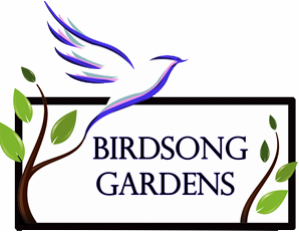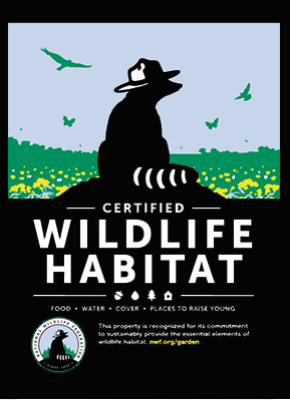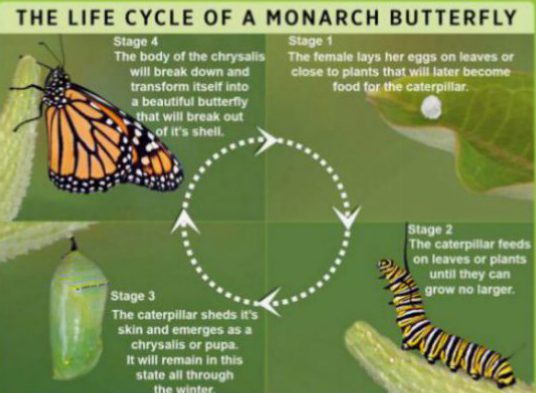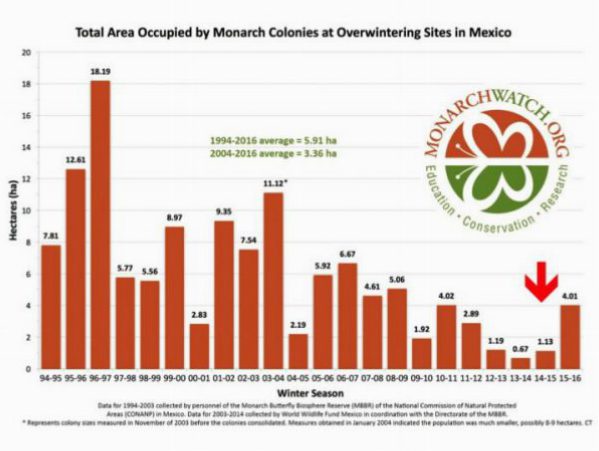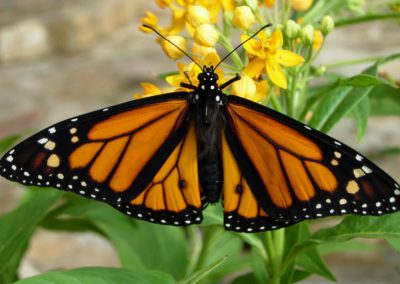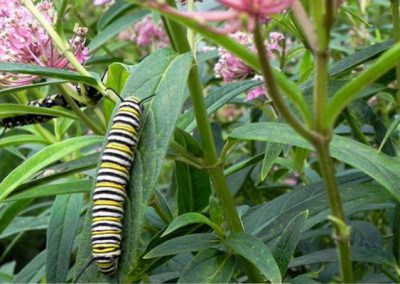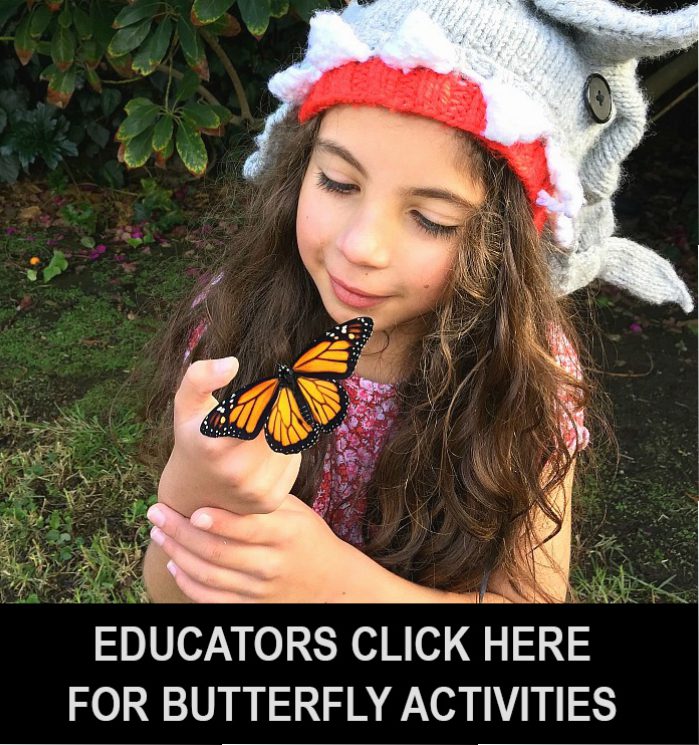
A CERTIFIED WILDLIFE HABITAT
Birdsong Gardens dedicated 5 acres of land for a monarch habitat and hopes to maintain this for years to come as a sanctuary for butterflies in 2016. In early 2017, Rickards demonstrated that he had provided ample sustenance and cover, a place to grow young and continued sustainable practices. His efforts were awarded as birdsong Gardens became an official Certified Wildlife Habitat® site with the National Wildlife Federation and Delaware Nature Society.
WHY MONARCH BUTTERFLIES?
These fascinating butterflies are best known for their migration. The milkweed plant is vital to the survival of Monarch butterflies. It provides a home for the egg, provides a source of food for the Caterpillar, nectar of the butterflies and protection for the species as toxins found in the milkweed plant make the Monarch poisonous to most predators. The entire metamorphosis process from egg to adult takes about one month to complete. An adult can live up to 9 months, which allows for its famous migration to Mexico for the winter months.
Like most endangered species, loss of habitat has created a catastrophic decline over the last 20 years. In 2012 only 60 million butterflies made it to Mexico, a stark contrast with previous years which averaged 450 million. Monarch butterflies, like the freshwater mussel, are part of our natural native ecosystem and can be saved with proper help from concerned citizens. These fragile butterflies can’t survive without a place to breed and milkweed plants are needed because they are the one and only host plant for monarch caterpillars. While mussel re-establishment may initially need the help of experts, growing milkweed for the butterflies can be done by anyone with a little land to spare. Therefore, creating community awareness of the importance of maintaining milkweed in the eco-system could have a vast effect on the fate of the Monarch if community members are willing to take a part in aiding their survival.
FUTURE PLANS:
Birdsong Gardens hopes not only to gather funds to maintain this acreage as a monarch sanctuary indefinitely, but also wants to become an small nature center which educates community residents about Monarch butterflies and what they need to survive. When the butterflies are in the milkweed fields Birdsong Gardens will host field trips for school children and extend invitations to interested community residents. To help further educate community residents, both young and old, Dave Rickards plans to create a display case featuring the monarch during its life cycle and how it interacts with milkweed plants. The center will also have charts indicating the migratory path of the monarchs and have a viewing screen showing their final destination in Michoacán, Mexico. Birdsong would also like to offer seed packets so interested parties could plant small plots of milkweed at their own residences. Once established, he would give them several Monarch caterpillars to help further the cause.
EDUCATORS:
Download a pack of printable charts on the life cycle of butterflies here for your students here:
http://www.homeschoolcreations.net/monarch-butterfly-life-cycle-printables/
Watch a butterfly laying eggs on milkweed here:
DONATIONS:
If you would like to make a donation to Birdsong Gardens for the purpose of continuing this monarch sanctuary and aiding with the community education project you can make a donation to the Birdsong Gardens. Since Birdsong Gardens is a 501C(3) donors can deduct contributions they make to Birdsong
Gardens under IRC section 170. All donations will go directly to help maintain and preserve the lands for years to come and/or to help further community awareness.
A CERTIFIED WILDLIFE HABITAT
Birdsong Gardens dedicated 5 acres of land for a monarch habitat and hopes to maintain this for years to come as a sanctuary for butterflies in 2016. In early 2017, Rickards demonstrated that he had provided ample sustenance and cover, a place to grow young and continued sustainable practices. His efforts were awarded as birdsong Gardens became an official Certified Wildlife Habitat® site with the National Wildlife Federation and Delaware Nature Society.
WHY MONARCH BUTTERFLIES?
These fascinating butterflies are best known for their migration. The milkweed plant is vital to the survival of Monarch butterflies. It provides a home for the egg, provides a source of food for the Caterpillar, nectar of the butterflies and protection for the species as toxins found in the milkweed plant make the Monarch poisonous to most predators. The entire metamorphosis process from egg to adult takes about one month to complete. An adult can live up to 9 months, which allows for its famous migration to Mexico for the winter months.
Like most endangered species, loss of habitat has created a catastrophic decline over the last 20 years. In 2012 only 60 million butterflies made it to Mexico, a stark contrast with previous years which averaged 450 million. Monarch butterflies, like the freshwater mussel, are part of our natural native ecosystem and can be saved with proper help from concerned citizens. These fragile butterflies can’t survive without a place to breed and milkweed plants are needed because they are the one and only host plant for monarch caterpillars. While mussel re-establishment may initially need the help of experts, growing milkweed for the butterflies can be done by anyone with a little land to spare. Therefore, creating community awareness of the importance of maintaining milkweed in the eco-system could have a vast effect on the fate of the Monarch if community members are willing to take a part in aiding their survival.
FUTURE PLANS:
Birdsong Gardens hopes not only to gather funds to maintain this acreage as a monarch sanctuary indefinitely, but also wants to become an small nature center which educates community residents about Monarch butterflies and what they need to survive. When the butterflies are in the milkweed fields Birdsong Gardens will host field trips for school children and extend invitations to interested community residents. To help further educate community residents, both young and old, Dave Rickards plans to create a display case featuring the monarch during its life cycle and how it interacts with milkweed plants. The center will also have charts indicating the migratory path of the monarchs and have a viewing screen showing their final destination in Michoacán, Mexico. Birdsong would also like to offer seed packets so interested parties could plant small plots of milkweed at their own residences. Once established, he would give them several Monarch caterpillars to help further the cause.
EDUCATORS:
Download a pack of printable charts on the life cycle of butterflies here for your students here:
http://www.homeschoolcreations.net/monarch-butterfly-life-cycle-printables/
Watch a butterfly laying eggs on milkweed here:
DONATIONS:
If you would like to make a donation to Birdsong Gardens for the purpose of continuing this monarch sanctuary and aiding with the community education project you can make a donation to the Birdsong Gardens. Since Birdsong Gardens is a 501C(3) donors can deduct contributions they make to Birdsong
Gardens under IRC section 170. All donations will go directly to help maintain and preserve the lands for years to come and/or to help further community awareness.
